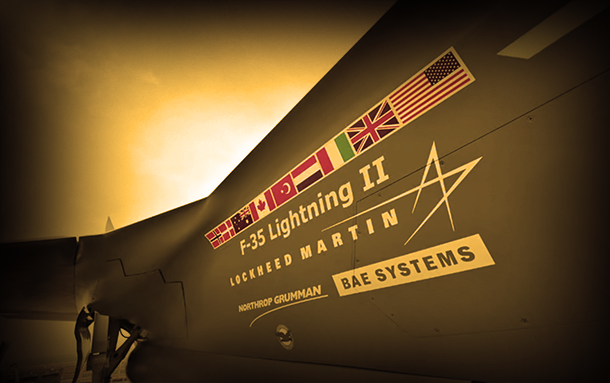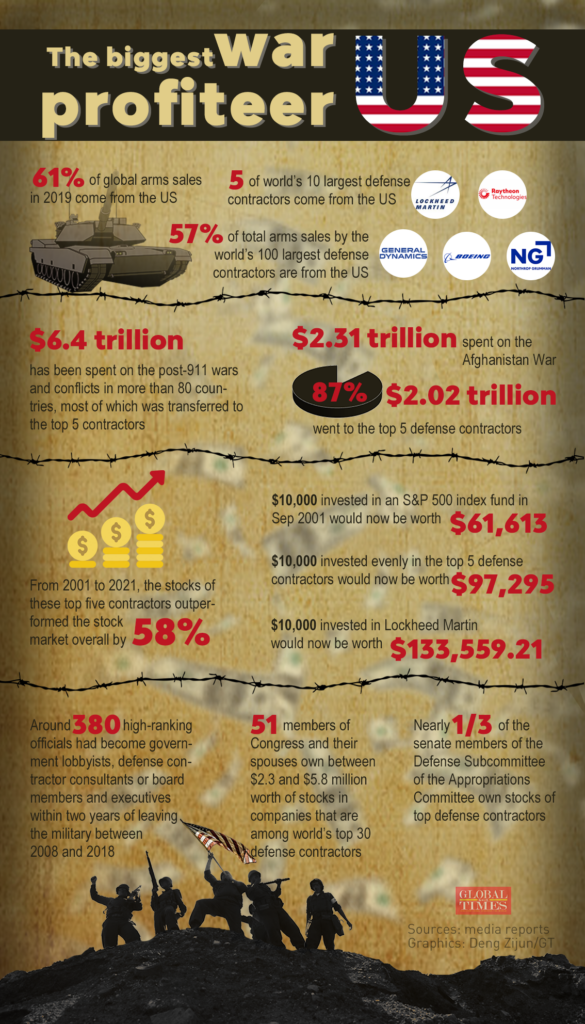from 21st Century Wire:

War is a bad thing. Most people will agree. Often a war is perpetrated for an ostensibly good cause. It is seen as an unfortunate side effect that regular people are killed, maimed, scarred and diminished – whilst the ‘baddies’ somehow remain at large. Well then, if war is bad, and often ineffective, why does it continue?
In this article we will delve into the private corporations who insidiously overlap with their governmental and media counterparts to promote, fund and facilitate endless conflicts. We will also assess the case for acts of war and explore the theory that war is often perpetrated for financial profit rather than any moral cause.
TRUTH LIVES on at https://sgtreport.tv/
Cui Bono?
‘Cui Bono’ is a fancy Latin phrase, that you might hear from Sherlock Holmes during an investigation. It means, ‘Who benefits?’. It is often used in political discourse as a knife to cut through the tangled webs of intrigue and speculation around events and get to the heart of the matter. Here we are discussing a global business, arms manufacturing and sales. It is a worldwide industry and has myriad influences. When it is presented in sound-bites by the corporate-owned media, we are seeing a glimpse, only a small portion of the picture. It is usually designed to make the reader or viewer think a certain thing – as we will discuss later. Yet when we take a wide-lens view the picture becomes cloudy with many different angles. We ask cui bono? – who benefits from violent conflict, in particular those hot conflicts of today: Ukraine/Russia, Israel/Palestine, Saudi Arabia/Yemen and so on?
It is an easy implication to lay at the door of the arms industry. More violence is more profit. Even mere instability in a country can lead to a ramping up of arms purchases by the military of a state. The massive price tags for weapons, the long lead-time of research and development coupled with the bottomless pockets of government budgets make for a fertile landscape for exploitation. It is not only the private military corporations who benefit, but the politicians and nation states too. The politicians get huge kickbacks from lobbyists, too much money to maintain that moral compass they may have once had. They also have a useful ‘casus belli’ – a ‘case for war’ which is a sure fire vote winner. Remember that Margaret Thatcher was set to lose her seat as leader of the UK until a miraculous military victory over Argentina in 1982 galvanised massive public support and a massive electoral victory. War for votes is nothing new. Yet these days, selling war is an uphill battle. I believe, perhaps naively, that most people don’t like suffering and violence. The Anglophonic destruction of Iraq through two wars ended up an unpopular decision, similarly the US’ failed conquest in Vietnam is viewed regretfully in hindsight. So we are left pondering, why must suffering the curse of armed warfare continue?
Before we delve too deep into the long grass, let us set our sights on our targets. We know the names of countries, sometimes politicians, but who are the arms dealers, the manufacturers of death who lurk in the shadows and create shiny new weapons of mass destruction?
“They call it warfare, but your wars aren’t fair
If they were there’d be suicide bombers in Arms Fairs
On a scam for the funds, they will mangle your son
If you try to speak out, they will stamp on your tongue
To your land they will come ’till you stand up as one”
– Lowkey
Lockheed Martin
Clocking in at $66bn in sales per year, Lockheed Martin is the biggest arms manufacturing corporation in the world. It started out as a fraternal airplane company 100 years ago, yet after the great depression it shifted to US military production in the 1930’s. It quickly became the US’ number one aircraft manufacturer. When it became insolvent in 1971 it was bailed out to the tune of billions of taxpayer funds. Shortly thereafter it emerged that Lockheed had been guilty of massive bribery of officials for military contracts. A practice that continues to this day.
Lockheed Martin continues to have an active presence in Israel: “Lockheed Martin is proud of the significant role it has fulfilled in the security of the State of Israel.” Where they not only supply weapons and machinery, but also fund university programmes demonstrating the well rounded integration of arms manufacturing with civil society of a nation state. Similarly n the UK Lockheed Martin have funded a £50million programme at Northumbria University for space technology including weapons and surveillance technology. You too can go to the school of Lockheed Martin and take part in a global empire of war!
Lockheed Martin are currently facing a court case from Yemeni families who were bombed during a wedding ceremony. Such a bombing is a war crime, it is actually illegal to bomb civilians, and the victims’ families are trying to hold arms manufacturers to account for their part. Yet as the lawyer said in a statement: “I think most judges are going to be very afraid of issuing decisions that would somehow step into the dynamics of the … weapons supply relationships between the U.S., Saudi Arabia and UAE.”

Raytheon (also known as RTX)
Raytheon, or RTX to its friends, clocks in at $67billion of arms sales per year, just short of Lockheed Martin. Another 100 year old company, Ratheon was borne of innocuous beginnings manufacturing refrigeration tubes. Following the aforementioned trajectory, they were weaponsied in 1930s USA where they manufactured magnets for radar equipment and military fuses. This research also lead to the invention of the microwave oven in 1945. By 1948 they had full military credo as they invented the first missile guidance system which took down its first plane in 1950.
Read More @ 21stCenturyWire.com



